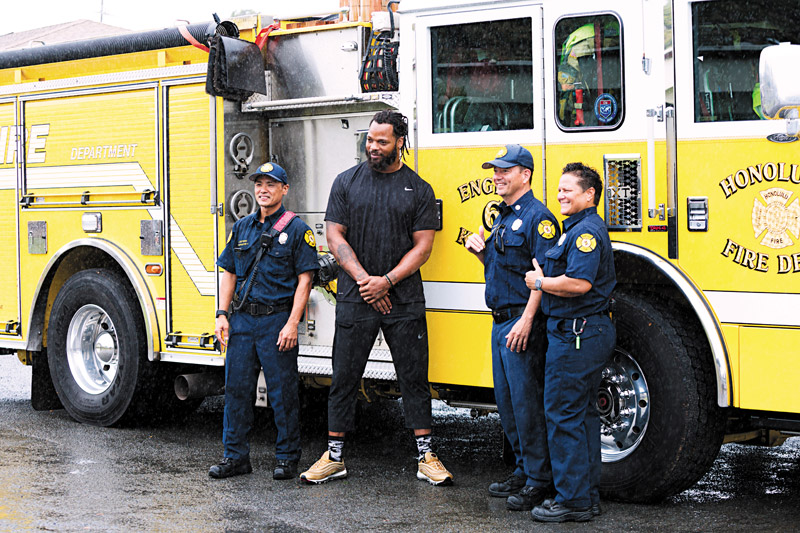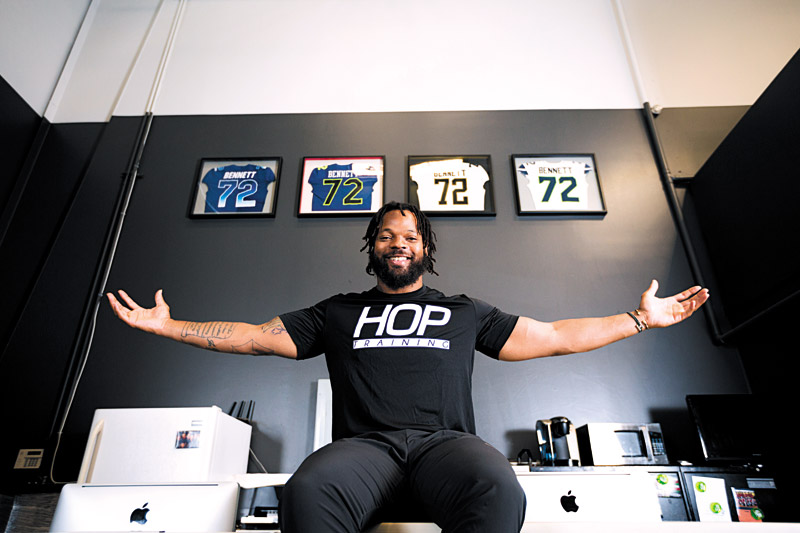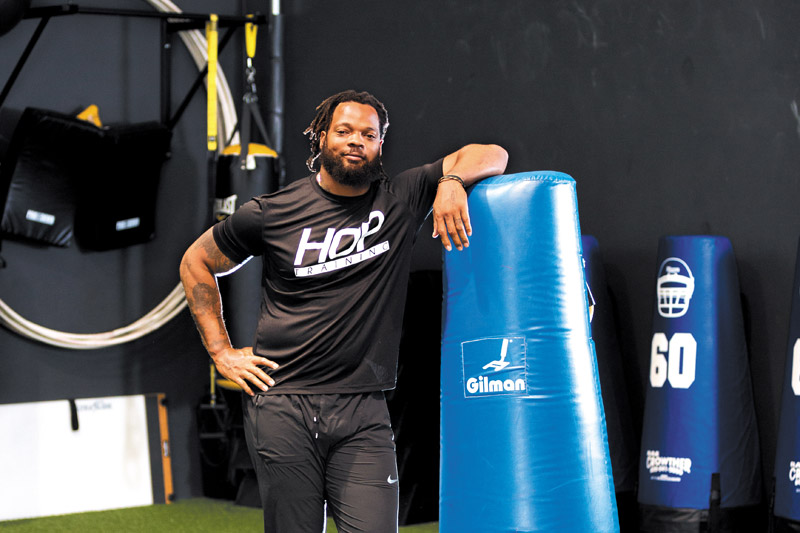Big Man, Big Opportunity
Pro football player Michael Bennett may be a bad man on the field, but he tries to do as much good as possible when he’s off it.
The way Michael Bennett has spent the last decade feasting on NFL opponents and making the game of professional football look so easy, you’d think he grew up dreaming of stuffing ball carriers and terrorizing quarterbacks on Sundays.
Nope.
Before he was dropping enemy signal-callers like nobody’s business and doing his “Ravishing” Rick Rude-like sack dance with his hands behind his helmet and his hips in a swivel, a young Bennett envisioned himself as a hustling G-Man for the FBI, or as a chef rustling up specialty dishes for customers.
And when he wasn’t contemplating future work environments, his head would often be buried in books, immersed in the fantasy universes of Star Wars and The Lord of the Rings. Or he’d be watching his favorite movie, Tombstone, for the umpteenth time, and rediscovering moral righteousness and honorable heroes to emulate in Wyatt Earp and Aragorn.

Bennett serves up healthy food options with wife Pele at the annual O.C.E.A.N. Health Fest, held May 4 at Kapalama Elementary School.
As the professional athlete and social justice crusader often says when speaking to youth: “With books, you can be anything you want to be.”
“I loved how Wyatt Earp slapped the man when he got off the horse. He was someone who had integrity no matter what,” gushes Bennett, his eyes lighting up at his childhood memories. “As for Aragorn, well, I see myself in him. He’s a king, but he doesn’t know he’s a king just yet. But he’s got integrity.”
All of which is to say, Bennett has always been more than just a football player. Sure, he’s a big dude at 6-foot-4 and 275 pounds, who happens to play a mean game between the hash marks. But what really defines this mountain of a man are his larger-than-life dreams and those principles he chooses to live by — like integrity, fairness and perseverance through adversity.
Nothing better encapsulates the man than The Bennett Foundation, which he and wife Pele established with their children five years ago to improve the health and well-being of keiki and their ‘ohana, while also educating under-served communities in Hawai‘i, Texas and Washington.

Hanging out with firefighters (from left) Jaime Quitvis, Capt. Leroy Mulleitner and Mahi Spencer during O.C.E.A.N. Health Fest May 4 at Kapālama Elementary on O‘ahu.
To that end, Bennett and his foundation held its annual O.C.E.A.N. Health Fest at Kapālama Elementary School on O‘ahu in May, when scores of attendees learned about affordable cooking alternatives and healthy diets while taking advantage of free health screenings and physical fitness activities. (O.C.E.A.N. stands for fighting Obesity through Community, Education, Activity and Nutrition.)
Then in June, he held his annual Gauntlet Football Camp on O‘ahu, where young participants worked on their gridiron skills while receiving quality instruction from Bennett and his cadre of coaches, including defensive lineman DeForest Buckner of the San Francisco 49ers.
“As an athlete, I feel we owe it to our communities to create opportunities where kids can participate in things that don’t cost money. At the end of the day, we’re already getting paid millions and millions of dollars, so what’s the point of charging kids to come to a camp?” says Bennett, who spent many offseasons vacationing in Hawai‘i before finally purchasing an East O‘ahu home a few years ago for Pele and their three daughters: Peyton, Blake and Ollie.
In looking out for the underprivileged, Bennett recalls his own humble circumstances as a child raised in a low-income neighborhood.
“I just remember growing up and wanting to go to camps and knowing my parents couldn’t afford them,” he says.
Now, he’s in a dream position to assist the less fortunate while also teaching them many of life’s lessons, including their obligation to their communities.
“The focus of our foundation is to create fairness and equality for people who don’t have opportunities,” Bennett continues. “But it’s also to plant that seed in these kids’ minds that when they have a leg up in life, that they turn around and give to other people, too.” ry as he might, the soft-spoken Bennett has been unable to avoid controversy at times, making headlines for both his outspoken nature and his run-ins with the law.
Back in 2016, for example, he came under fire for his criticism of Golden State Warrior Stephen Curry after the all-star point guard hosted a camp at BYU-Hawai‘i and charged each participant $2,250.
He later clarified his remarks by saying, “I don’t think Steph was taking advantage of the situation. It’s just that for someone like me who lives in Hawai‘i, I see how the kids are and what they go through. Some of these kids don’t even have lunch money. So I just think that when (athletes) go to places (to hold camps) and participate with locals who may not have a voice, or the opportunity, that we do our part to elevate them.
“Opportunity is everything.”
The next year following the violence in Charlottesville, Virginia, he chose to sit when the national anthem was played at games — his way of protesting what he saw as an example of social injustice — and immediately drew the ire of many football fans who labeled his actions unpatriotic.
Soon after, Bennett claimed police officers used excessive force on him after racially profiling the athlete outside a Las Vegas nightclub. The incident remains under investigation.
Then, in 2018, he was alleged to have injured an elderly paraplegic worker at Super Bowl LI, and a warrant was issued for his arrest. Criminal charges were eventually dropped after prosecutors determined there was insufficient evidence.
To Bennett, people have long misread his demeanor or confused his honesty for boorishness. As a result, some viewed him as difficult and uncoachable coming out of Texas A&M, and those doubts likely contributed to Bennett going undrafted in 2009.
“I question things — that’s how I grew up. My whole family always questioned things,” says Bennett, who has two sisters and three brothers, including his younger sibling Martellus, a tight end who was selected by the Dallas Cowboys in the 2008 NFL Draft.
“But sometimes people think that when you’re thought-provoking and ask questions like, ‘Why am I doing this?’ they see it as you being rude. Sometimes people don’t want to be questioned when they’re in positions of authority.”
Despite the trouble that occasionally follows Bennett, his influence within the Hawai‘i community is on the rise, particularly among its youngest minds. It’s why University of Hawai‘i at Mānoa selected Bennett to be the keynote speaker at its May commencement exercises.
“It was a way for me to give back — to be insightful and inspirational while sharing a great message with the students, who are tomorrow’s leaders in America,” explains Bennett.
“I wanted them to know that there are no labels on what they can be. You can be a doctor, a lawyer and a scientist at the same time if you want.
“There was a time I felt that society was (limiting) people to be one thing, and that’s all you could be.
“But the truth is there are no limits, and I think that’s important for young people who are graduating and going into the world to know.”
orn in Independence, Louisiana, Bennett was raised in Houston, Texas, where he excelled in football, baseball, and track and field at Alief Taylor High School.
“In my community, we always played sports because our parents were always working,” he says. “Basically, sports was our day care.”
Blessed with size and athleticism, he enrolled at Texas A&M, where after four seasons of playing defensive end for the Aggies he was viewed as an intriguing pro prospect with long arms, plenty of power and a quick first step off the edge. When the NFL Draft rolled around, Bennett was hopeful to be among those selected.
Yet at the end of seven rounds, his was not among the 256 names called.
“I think anytime you put a lot of work into something and it doesn’t go the way you expected, there’s going to be some disappointment,” he recalls.
Still, Bennett believed he had a future in the NFL.
“There’s always that point when adversity happens that you can either jump over the hurdle or stay there,” he says. “For me, I never thought about staying there; I was always going to keep propelling myself forward in life.”
Bennett credits his inner drive to “my connection with my ancestors.”
“My parents had grit; they were hard workers,” he notes. “My mom worked her way through college, my dad was in the military and my grandpa was a farmer. Everybody worked hard jobs, so whenever something bad happened, it was just a part of our culture to fight through the trauma.
“That’s just part of my DNA — to overcome,” he adds.
Shaking off the draft-day snub, he made a brief stop in Seattle as a free agent before signing with the Tampa Bay Buccaneers, who immediately penciled him in at defensive tackle. The move paid dividends as Bennett played a significant role in the resurgence of the Bucs’ defense. In 2012, he was credited with a then-career best 41 tackles, nine sacks and three forced fumbles.
The following year, he returned to Seattle, turning the Seahawks into the league’s top-rated defense and willing the team to victory in Super Bowl XLVIII. Two years later, he again helped Seattle qualify for Super Bowl XLIX, where it lost to New England, 28-24.
“Being undrafted made me a better player,” says Bennett, who’s been recognized as one of the league’s best defensive linemen by being named to three Pro Bowls during his career. “Even with all the stuff I’ve accomplished, I like to think there’s always more.”
And yet, Bennett knows the end is drawing near. After 10 seasons in the NFL, he was traded to Super Bowl-champion New England last spring. The move intrigues him because he’ll be doing battle in a new conference (AFC) for the first time. But he’s most excited about joining a modern-day dynasty in the Patriots and playing for legendary head coach Bill Belichick.
“The Patriots are the last stop for me. For however long that is, for however short it is, that is where I’ll end my career.”






